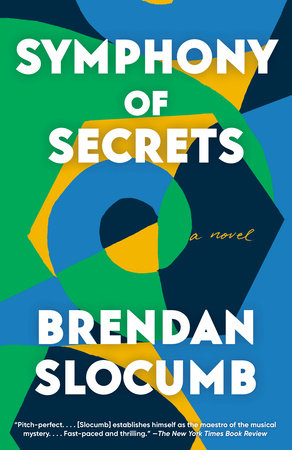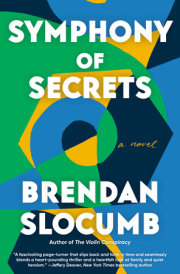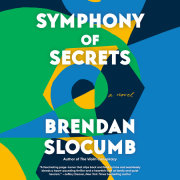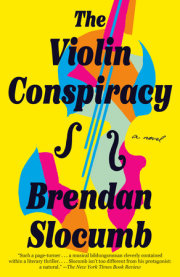1
The Extra K
Bern
Professor Bern Hendricks was late to class when the sound of an incoming email pinged in his inbox. He’d put on his favorite blue pinstripe, short-sleeve, but nobody would notice under his jacket and, wouldn’t you know, there was a wrinkle right under the pocket. The jacket didn’t completely cover it. So he’d had to haul out the ironing board and heat up the iron, and that took longer than it should have. Now he was running a good ten minutes late. But with the Quicksilver symphony flooding his earbuds, how could he hurry? The students could wait a few more minutes.
Maybe he should just skip class altogether, he thought. The Quicksilver was the obvious excuse. Delaney’s Quicksilver—so-called because of the extraordinary melding of alto and tenor saxes layered over French horns—was one of Bern’s absolute favorites. Bizet had effectively used an alto sax in his L’Arlésienne Suite, but Delaney’s Quicksilver took it to an entirely different level. Every time Bern listened to the allegro moderato movement, it was as if a hole suddenly opened up in his chest and music cascaded in. No matter how many times he heard it, the melody rippled across his spine and he shivered under its impact. “That was double good,” he mumbled to himself.
No wonder Frederic Delaney was the hands-down best composer— not just in America, Bern would argue, but in the entire world.
So there he was, seriously considering missing a class in only his second week of teaching just to listen to a symphony he’d heard hundreds of times before—when his email chimed.
He stared at his phone, hit Pause on the music.
Even without Delaney’s music playing, it seemed as if Frederic Delaney were, right then, communicating directly with Bern from beyond the grave. The email was from the executive director of the Delaney Foundation. What were the odds that he’d get a message right when he was listening to—
He opened the email.
Dear Bern:
I hope you have been well since we last met.
I’m reaching out with a time-sensitive matter regarding Frederick Delaney.
I know that the school year has just started and you must be quite busy, but would you contact me as soon as you get this? Please call the number below, no matter the hour, from a location where you can speak freely. Someone will always be monitoring this line.
Sincerely,
Mallory Delaney Roberts
Executive Director
The Delaney Foundation
Right then he was halfway across UVA’s grounds, minutes from class. In the shadow of the ancient oak trees, the lushness of the early autumn grass glowed around him. He took a breath, and then another. Students played Frisbee on the terraces.
He wasn’t aware of any of them, even when a Frisbee sailed past his left cheek, so close that he felt its breeze.
The email was some kind of scam. It had to be. Mallory Delaney Roberts wouldn’t be writing to him. He doubted she even remembered who he was. She’d met him only a handful of times. Last month he’d seen an article in Time announcing a partnership between the Delaney Foundation and the Vatican for new musical outreach to Eastern Europe. And this woman was calling him Bern? The words glowed on the screen.
I’m reaching out with a time-sensitive matter regarding Frederick Delaney.
He’d paused right before his favorite section in the Quicksilver: the French horns’ epic battle with the trombones, when the horns fought for supremacy but the trombones would, in just a second, kick their asses. “Sorry, horns,” he mumbled as he logged out of his playlist. He googled the Foundation and clicked the link to the website, where Mallory’s thumbnail photo smiled serenely at him. A bouffant helmet of too-dark dyed hair, pearl earrings, and a pearl choker.
The most memorable and last time they’d met, she had clasped his hands with both of hers and said, “Congratulations” and “I’m so sorry for your loss.” He’d shaken her hands and said, “Thank you,” and when he’d met her eyes, he had seen the gleam of tears to match his own.
By then, a month after their adviser, Jacques Simon, had passed away, there had been just two PhD students left in the program: Julie Ertl, who was already making plans to quit academia and go into advertising, and Bern. The ceremony—the unveiling, the signing of the books, the presentation of the first printed copy to the Delaney Foundation—had seemed empty and all too silent without Jacques, who’d revered Frederic Delaney almost as much as Bern did. Almost.
He was about to be fifteen minutes late—the cutoff for how long students had to wait for a professor. They’d probably already be packing up. They might as well get a head start on the weekend, he decided. And this matter was time sensitive.
He’d explain and apologize to the kids next time.
Instead of heading up to the lecture hall, he dashed down to his office in the bowels of Old Cabell Hall. It had been built at the turn of the century, with typical Greek Revival architecture of red brick behind white columns—nothing like Columbia’s chaos of golden stone and modern glass. Here the hallways and classrooms smelled musty and of distant mice.
Bern locked the door to his tiny broom closet of an office, sat down, and dialed Mallory’s number.
The phone rang only once before a brisk woman’s voice answered. “Delaney Foundation. Hello, Professor Hendricks. Hold, please, and let me put you through.”
The phone clicked, and then another woman’s voice, smoother, slipped through the phone line. “Bern. I’m so glad you reached out as quickly as you did.”
He recognized her voice: old money, the most expensive prep schools in Connecticut or Rhode Island. “Of course,” he said. “It’s a pleasure to speak with you, Ms. Delaney.”
“Bern, please. We’ve been through this before. It’s Mallory, remember?”
“I know,” he said, “it’s just—” He didn’t know how to complete the sentence. He was speaking to royalty. This was a woman who probably had the president of the United States in her “favorite contacts” list. And she knew who he was: Bern Hendricks, a poor kid from Milwaukee who used to eat bologna three times a week because his family couldn’t afford anything else. Again—involuntarily—a wave of gratitude for Frederic Delaney, for all that Delaney had given him, washed over Bern.
“Are you someplace you can talk?” she was saying.
“I’m in my office.”
“Are you alone?”
“Yes,” he said, sitting up straighter. Had he done something wrong? Had the Foundation discovered some error or discrepancy with his work on the Quintet? He’d gone over those footnotes dozens of times. He, Jacques, and Julie had all triple-checked one another’s work. What was the problem? “Is there something I can help you with?”
“As a matter of fact, there is. Something urgent has come up.” She paused. “We found some original documentation from my uncle, and we wondered if you’d be interested in an opportunity to assess it.”
“Documentation? What kind of documentation? Music? Letters?” Adrenaline and relief shot through him, a cold rush of blood from the top of his head to his feet and back. She probably wanted him for something small and meaningless, he told himself. Frederic Delaney had been one of the twentieth century’s most prolific composers; he’d known everyone, so new letters often surfaced at auction houses or estate sales. Some letters—the ones with great signatures and substantive text—sold for tens of thousands of dollars.
“We found something that requires someone with a specific skill set. And of course I thought immediately of you.”
“Okay,” he said, thrilled to help. “Can you email it over? I can look right now. What is it?”
“I’d rather discuss this in person, if you have the inclination. There’s also a nondisclosure agreement that we’d need you to sign.”
“A nondisclosure agreement?” Bern repeated. His brain was churning. “What did you find?”
“Again, I’d—”
“Are you here?” he asked. “In Charlottesville?”
“No,” she said, “I was rather hoping I could lure you up to our offices.” He could hear her smile. “We’re on the top floor of the Foundation, as you may remember. Quite near Juilliard.”
She wasn’t going to tell him what they’d found, that much was clear. But he wanted more information. He tried a different tactic. “What kind of skill set are you looking for?”
“Partially it’s your work on the Rings Quintet,” she said slowly. “And you probably know more about Frederic Delaney than almost everyone. Including me, and I’m related to him.” Again, he could hear that smile through the telephone.
“Let me look at my schedule.” He checked his calendar. “I could possibly fly up Friday afternoon, if I can get a flight out. I’m teaching all this week. But this feels like quite a haul for some documentation. Are you sure you can’t just scan it and send it to me via email? I’m happy to sign your nondisclosure electronically.”
“We’d rather show you. We haven’t allowed scans yet of the—of the—documents.”
Something about the way she hesitated over that last word sent Bern’s head spinning. What kind of document would she be reluctant to scan? Was it so fragile?
“You must have found something really special,” he said. A diary? Delaney had kept no journals, although he did use an office calendar that he never fully updated. Could it be a letter discussing the genesis of the Quintet? That would be life changing—Delaney had rarely mentioned his inspirations for the opera cycle, which was why Jacques Simon had created the annotated Quintet in the first place: all those painstaking scholarly attributions for all of Delaney’s musical influences had taken them eight years to compile.
Another pause. “It is. It’s—” She didn’t finish the sentence.
“Did you find an undiscovered piece of music?”
One of Delaney’s compositions turned up now and then. The most recent time one was found and played—the Domino Winds overture—the New York Philharmonic had premiered to a packed auditorium and received a seven-minute standing ovation, and the audience had shouted, “Again! Again! Again!” until the Philharmonic encored the overture, in true Delaney fashion.
“I really can’t discuss it over the phone,” she said.
So it was an undiscovered piece of music. It had to be.
Of course.
He said slowly: “You found it, didn’t you?”
“I beg your pardon? We—”
“You found it. You found a piece of RED. You found the original. How much? The overture? An aria?”
A very long pause, during which Bern tried to assess what it would mean, finding even a page of the original RED. His head swam.
“Bern, please. I—I think this would be better discussed in person, in the proper setting,” she said, stumbling over her words, sounding on edge. “Can you be here once you’re done teaching for the week?”
“Just tell me this. How much did you find? Is it more than a page? Do you have a whole act?”
“Bern, I—”
Her hesitation was enough. “I’ll be there tonight,” he said. Before Mallory could respond, he was already on his laptop, emailing the head of the Music Department to say that due to an emergency he would need to cancel all his classes for the rest of the week—could a graduate student take over?
“That’s wonderful news,” Mallory said. “We’ll send our plane to pick you up. When can you be ready?”
It was actually happening. A piece of RED—the elusive, mysterious, impossible RED—had been found.
And out of everyone on the planet, Bern himself—a poor bologna-sandwich-eating kid with a beat-up French horn—was going to actually see it. Be one of the very first people to touch it, to decipher Frederic Delaney’s distinctive handwriting.
“Give me an hour,” he said.
Copyright © 2023 by Brendan Slocumb. All rights reserved. No part of this excerpt may be reproduced or reprinted without permission in writing from the publisher.













